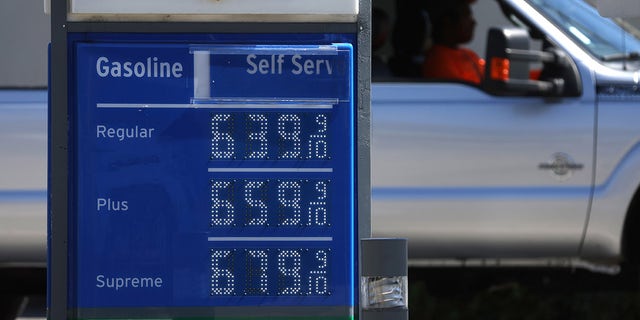Experts shred Gavin Newsom’s blame game for California’s high gas prices
Economists and oil market experts sharply criticized Gov. Gavin Newsom, D-Calif., for his recent rhetoric blaming “greedy oil companies” for high gasoline prices in California.
“Gas prices are up while oil companies rake in RECORD profits,” Newsom tweeted Monday. “It. Does. Not. Add. Up. We cannot continue to allow greedy oil companies to rip us off at the pump.”
Newsom has repeated the argument for weeks, adding that he would support a new windfall tax on oil companies to punish “oil company extortion” in a video message posted by his office late last month. Such a tax code revision wouldn’t be introduced by the state legislature for months.
In California, the average price of gasoline remains above $6 a gallon, far higher than any other state, according to AAA data. The state with the next highest average pump price is Alaska where gas costs $5.40 per gallon.
GAVIN NEWSOM’S 2024 CHANCES COULD BE THREATENED BY CALIFORNIA’S ENERGY GRID STRUGGLES
While Newsom and other Democratic lawmakers have repeatedly blamed oil companies for profiteering, experts said the argument is a red herring.
“Some people may fall for it, but I think people are getting tired of this story,” David Kreutzer, the senior economist at the Institute for Energy Research, told FOX Business. “It seems like they’re always gouging in California. You have to say, ‘Well, what’s California doing different today?’ They have a bunch of idiotic policies.”
“You’d have to explain why [oil companies are] ripping people off 50% more in California than the rest of the world and why they only choose to do it now,” Kreutzer said. “The big problem is we have policies in place, especially in California, that make it difficult to expand supply. When you have these rules and regulations that prevent markets from responding as robustly as they could, then prices are going to go up.”
CALIFORNIA’S GRID LEANING HEAVILY ON NATURAL GAS TO SURVIVE ENERGY CRISIS, DESPITE GREEN PUSH
Kreutzer and other experts said energy policies passed in California have exacerbated price increases in recent years.

For example, the state requires refiners to produce a higher-grade gasoline, which is generally costlier for consumers, during the summer months to protect air quality. In addition, regulations make it hard for companies to build new refineries, increase refinery capacity or boost oil production in the state.
Gasoline prices in California have also declined over the past two weeks after surging in response to multiple unexpected refinery outages.
CALIFORNIA GOV. GAVIN NEWSOM ANNOUNCES COVID STATE OF EMERGENCY WILL END IN FEBRUARY 2023
“The concept of price gouging is kind of silly,” Benjamin Zycher, an economist and senior fellow at the American Enterprise Institute, told FOX Business in an interview. “Depending on demand and supply conditions, the good becomes more scarce, market prices rise. It’s that simple.”
“The idea that the refineries or the oil companies are profiteering off of market conditions in California, I think is not an argument to be taken seriously,” he continued. “Why weren’t they doing that 10 years ago, 20 years ago, five years ago?”
Zycher noted also that California has a high gasoline tax that drives prices up further. The state gas tax of $0.54 per gallon is the second-highest in the country.
“It’s really market conditions combined with the perverse public policies that have yielded $6 per gallon for higher prices in California,” he said.
John Cochrane, a Hoover Institution senior fellow, argued that while it is the fiduciary responsibility of oil companies to maximize profits, government policies are to blame for the current high prices.
“If gasoline providers do not maximize profits, they should be sued by their shareholders,” Cochrane told FOX Business. “But the source of high gas prices is simple: government restrictions on supply. Try building a new refinery in California, to make California special gas.”
“If gas sellers held down prices, or if the state forces them to, then more people want gas than there is [to] go around. Gas lines come back from the 1970s,” he said. “That’s the choice, given the government-imposed supply restriction: high prices or long lines. Allowing Nevada gas to be shipped in would bring down prices pronto.”
BIDEN ADDING TO HIS LIST OF OTHERS TO BLAME FOR SOARING GAS PRICES
In the early 1970s, the federal government implemented price controls, leading to long lines at gas stations nationwide, according to the Cato Institute.
“Politicians clearly are frustrated, and in their effort to improve the situation often make [it] worse by chasing short-term benefit over long-term price improvement,” Patrick De Haan, head of petroleum analysis at GasBuddy, told FOX Business when asked about Newsom’s argument. “It’s disgusting to see politicians on both sides of the political spectrum giving false context to get Americans on their side.”
“Politicians citing ‘greedy’ oil companies have often themselves been the real ones to blame for bureaucratic rules and red tape that impact markets,” he continued.
De Haan added that there is “nothing nefarious” about normal market fluctuations.
“When product is extremely tight, prices can surge — the basis of the price paid is not determined by oil companies but by markets,” said De Haan. “Similar to how the mechanics of the housing market work. Less homes on the market and hefty demand sees prices rise.”
“Oil companies do benefit in such an environment, but oil and gasoline is not a permabull market. There are deep cycles that come and go.”
CALIFORNIA URGES RESIDENTS AGAIN NOT TO CHARGE EVS ON BUSY TRAVEL WEEKEND
Other experts have also pushed back against price-gouging allegations in California and across the country.
Ed Hirs, an energy fellow at the University of Houston, told news channel KXTV in California earlier this month that Newsom has been playing “fast and loose with the rhetoric and the facts,” and Mark Agerton, an assistant professor at UC Davis, said the state’s strict gasoline rules prevent it from easily importing supply when market constraints occur.

In May, Dallas Federal Reserve economists Garrett Golding and Lutz Kilian published a report showing why gas prices don’t always rise and fall as oil prices change. The report highlighted how pump prices are often not even set by oil companies but by retail gas station owners.
And a federal judge dismissed a class-action lawsuit last month that accused oil companies of improper collusion to keep gas prices high in California, the San Diego Union-Tribune reported.
“Antitrust wrongdoing consists of concerted action pursuant to an illegal agreement, not independent profit-maximizing actions based on market conditions,” Judge Jinsook Ohta of the U.S. District Court for the Southern District of California wrote in her decision.
Newsom’s office didn’t respond to a request for comment.
Read the full article Here


